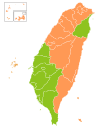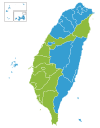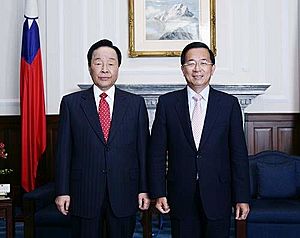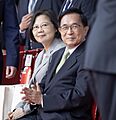Chen Shui-bian facts for kids
Quick facts for kids
Chen Shui-bian
|
|||||||||||||||||||
|---|---|---|---|---|---|---|---|---|---|---|---|---|---|---|---|---|---|---|---|
|
陳水扁
|
|||||||||||||||||||
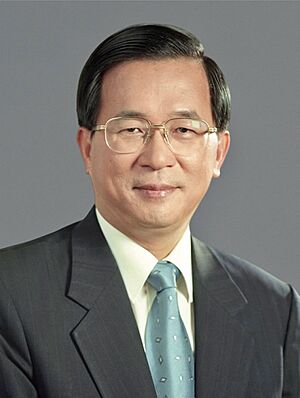
Official portrait, 2000
|
|||||||||||||||||||
| 5th President of the Republic of China | |||||||||||||||||||
| In office 20 May 2000 – 20 May 2008 |
|||||||||||||||||||
| Premier |
See list
|
||||||||||||||||||
| Vice President | Annette Lu | ||||||||||||||||||
| Preceded by | Lee Teng-hui | ||||||||||||||||||
| Succeeded by | Ma Ying-jeou | ||||||||||||||||||
| 9th & 12th Chairman of the Democratic Progressive Party | |||||||||||||||||||
| In office 15 October 2007 – 12 January 2008 |
|||||||||||||||||||
| Secretary General | Cho Jung-tai | ||||||||||||||||||
| Preceded by | Yu Shyi-kun | ||||||||||||||||||
| Succeeded by | Frank Hsieh (acting) | ||||||||||||||||||
| In office 21 July 2002 – 11 December 2004 |
|||||||||||||||||||
| Secretary General | Chang Chun-hsiung | ||||||||||||||||||
| Preceded by | Frank Hsieh | ||||||||||||||||||
| Succeeded by | Ker Chien-ming (acting) | ||||||||||||||||||
| 10th Mayor of Taipei | |||||||||||||||||||
| In office 25 December 1994 – 25 December 1998 |
|||||||||||||||||||
| Preceded by | Huang Ta-chou (as appointed mayor) | ||||||||||||||||||
| Succeeded by | Ma Ying-jeou | ||||||||||||||||||
| Member of the Legislative Yuan | |||||||||||||||||||
| In office 1 February 1990 – 25 December 1994 |
|||||||||||||||||||
| Constituency | Taipei I | ||||||||||||||||||
| Taipei City Councillor | |||||||||||||||||||
| In office 25 December 1981 – 28 September 1985 |
|||||||||||||||||||
| Constituency | Taipei II (Songshan, Neihu, Nangang) | ||||||||||||||||||
| Personal details | |||||||||||||||||||
| Born | 12 October 1950 Guantian District, Tainan County, Taiwan (now Tainan) |
||||||||||||||||||
| Political party | Democratic Progressive (1987–2008, 2013–2019, since 2020–) | ||||||||||||||||||
| Other political affiliations |
|
||||||||||||||||||
| Spouse |
Wu Shu-chen
(m. 1975) |
||||||||||||||||||
| Residences | Gushan District, Kaohsiung | ||||||||||||||||||
| Education | National Taiwan University (LLB) | ||||||||||||||||||
| Chinese name | |||||||||||||||||||
| Traditional Chinese | 陳水扁 | ||||||||||||||||||
| Simplified Chinese | 陈水扁 | ||||||||||||||||||
|
|||||||||||||||||||
Chen Shui-bian (born October 12, 1950) is a Taiwanese politician who served as the fifth president of the Republic of China (Taiwan) from 2000 to 2008. He is often called by his nickname, A-Bian.
Chen was the first president from the Democratic Progressive Party (DPP). His election ended 55 years of rule by the Kuomintang (KMT) party in Taiwan. Before becoming president, he worked as a lawyer and was the mayor of Taipei.
After his presidency, Chen faced serious legal troubles. In 2009, he and his wife were found guilty of breaking laws related to money. He was sentenced to a long time in prison but was released in 2015 for health reasons.
Contents
Early Life and Schooling
Chen Shui-bian was born into a poor farming family in Tainan County, Taiwan. He was a very smart student and did well in school. After graduating from a top high school, he went to National Taiwan University.
He first studied business but soon switched to law. He passed the difficult bar exam to become a lawyer before he even finished college, making him Taiwan's youngest lawyer at the time. He graduated in 1974.
In 1975, he married Wu Shu-chen. They have a daughter, who is a dentist, and a son, who is also a lawyer. For many years, Chen worked as a lawyer for a large shipping company.
Getting into Politics
Chen's political career began in 1980. He worked as a defense lawyer for people involved in the Kaohsiung Incident, a famous protest for democracy in Taiwan. This experience made him want to change Taiwan's political system.
In 1981, he was elected to the Taipei City Council. He also started a magazine that was critical of the government. Because of an article in the magazine, he was sentenced to a year in prison in 1985.
While he was appealing his sentence, he ran for office in his hometown of Tainan. After he lost the election, his wife Wu Shu-chen was in a terrible accident that left her paralyzed from the waist down. Many of his supporters believed the accident was a threat from the government.
Chen served eight months in prison. While he was there, his wife ran for a seat in the national government and won. After his release, he helped found the Democratic Progressive Party (DPP) and was elected to the national legislature in 1989.
Mayor of Taipei
In 1994, Chen was elected mayor of Taipei, the capital of Taiwan. He won because the two other main candidates from the KMT party split the vote between them.
As mayor, Chen was known for making many positive changes. He cracked down on illegal activities and improved public projects. He also renamed a major road in front of the Presidential Palace to Ketagalan Boulevard to honor the native people of the area.
Even though he was popular and got more votes in the 1998 election, he lost to Ma Ying-jeou. This was because the other political parties united against him. Losing the election taught him important lessons for his future political career.
Becoming President of Taiwan
In 2000, Chen ran for president. Just like when he became mayor, he won because the KMT party was split. Two candidates from the KMT side, Lien Chan and James Soong, ran against each other, which helped Chen win with 39% of the vote.
His victory was a historic moment for Taiwan. It was the first time someone from a party other than the KMT had become president.
First Term (2000–2004)
When Chen became president, he tried to work with the other parties. He appointed a premier from the KMT party and included members from different parties in his government. In his first speech, he promised not to declare Taiwan's independence as long as China did not threaten to attack. At first, he was very popular.
However, his government faced many challenges. The opposing parties controlled the legislature, which is like the congress, and often blocked his plans. The economy also struggled during this time.
One major disagreement was over building a new nuclear power plant. Chen's party was against it, but the KMT supported it. This conflict led to political fights and made it hard for the government to get things done.
Second Term (2004–2008)
Chen ran for re-election in 2004. The day before the election, a shocking event happened. While campaigning in the city of Tainan, Chen and his vice president, Annette Lu, were shot. They both survived with minor injuries.
Chen won the election by a very small margin, less than 30,000 votes. His opponents were upset and claimed the shooting was staged to get sympathy votes. However, an official investigation later concluded that a single person, who was found dead, was responsible for the shooting.
During his second term, Chen continued to promote Taiwan's identity. For example, the word "TAIWAN" was added to new passports. He also tried to buy weapons from the United States to help defend Taiwan, but the legislature blocked the purchase for a long time.
In 2005, Chen became the first Taiwanese president to visit Europe when he attended the funeral of Pope John Paul II in the Vatican. His presidency ended on May 20, 2008, when Ma Ying-jeou became the new president.
After the Presidency
After Chen left office, he lost his presidential immunity, which protects a president from being charged with crimes. He was investigated for his actions while in office.
In 2009, Chen and his wife were found guilty of serious crimes, including bribery and money laundering. The court said they had illegally taken millions of dollars. Chen was sentenced to life in prison, which was later reduced to 20 years. He became the first former president of Taiwan to be sent to prison.
Many of Chen's supporters believed the trial was unfair and was a form of political revenge by the KMT party.
Health and Release
While in prison, Chen's health became very poor. He suffered from depression, memory loss, and other health problems. In 2013, he attempted to harm himself.
Because of his poor health, he was granted medical parole and released from prison in January 2015. This means he can live outside of prison to receive medical care, but his prison sentence is not over. One of the rules of his release is that he cannot be involved in public political activities. He currently hosts a non-political radio show.
Images for kids
See also
 In Spanish: Chen Shui-bian para niños
In Spanish: Chen Shui-bian para niños
- Politics of the Republic of China
- Four-Stage Theory of the Republic of China
 | Audre Lorde |
 | John Berry Meachum |
 | Ferdinand Lee Barnett |


